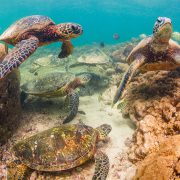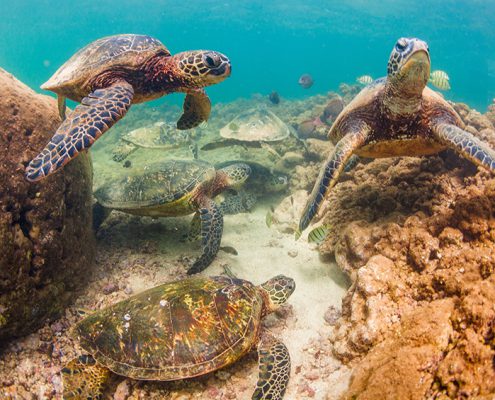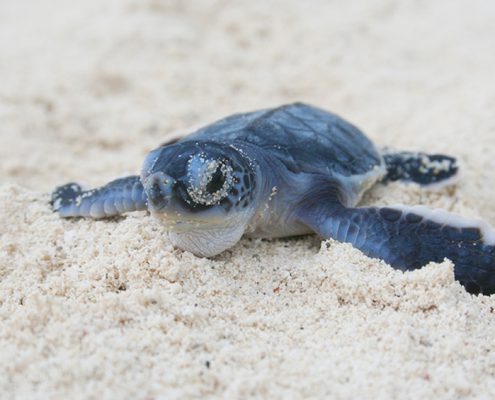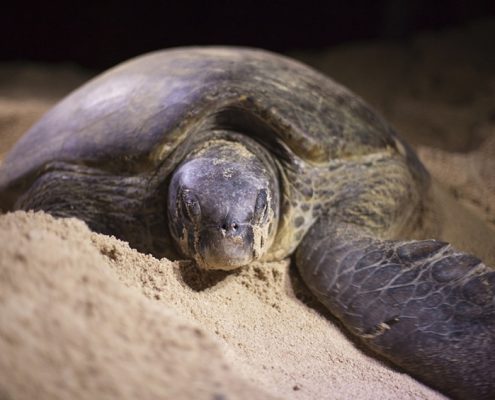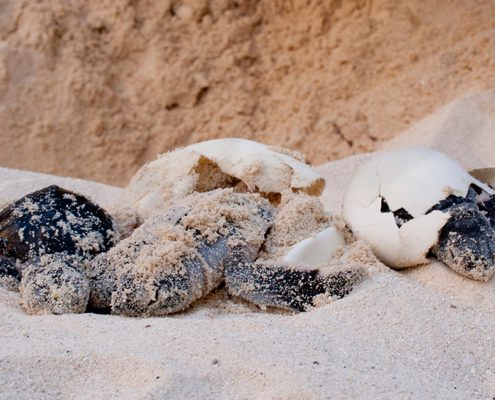May marks the beginning of sea turtle nesting season and your Grand Residences security guards are ready to join other turtle guardians in the annual statewide conservation campaign.
The Mexican Caribbean is one of the world’s most important nesting areas for endangered green, loggerhead and hawksbill turtles and it also receives occasional visits from the extremely rare leatherback turtle, the largest turtle species.
From May to September, our guards patrol the shoreline in front of Grand Residences and the adjacent lot on the look out for the female turtles that drag themselves ashore at night to dig their nests in the sand. When they find one they wait until she has laid her eggs and then carefully transfer them to a turtle nursery further up the beach. This enclosed area is protected from the waves, predators such as sea birds, crabs, raccoons, dogs and the passage of human feet. The eggs are deposited in a nest that has to be identical in shape and depth to the original nest. The date, time, species and number of eggs are recorded and the long wait begins.
Forty-five to 60 days later, the eggs hatch and the baby turtles struggle free from their shells. Exhausted, they are left to sleep and regain their strength. After several hours, instinct tells them it is time to be on the move.
The tiny turtles are released after dark when the gulls and frigate birds that prey on them have gone to roost. They scuttle across the beach towards the waves and a new life at sea. Hopefully, in 12 to 15 years time some of them will come ashore to lay their eggs in the very same spot, to the wonder of future Grand Residences guests.
If you are due to visit Grand Residences during the summer, join us in protecting these beautiful creatures.
- Alert the security staff
- Be very quiet and keep still
- Watch from a distance of ten meters
- Do not attempt to touch the turtle or crowd her
- Do not shine a torch or use the light on your mobile phone
- Please, no flash photography
- Turn terrace lights off at night
- No smoking
- Follow the instructions given by security staff at all times
- Help us to keep our beaches and sea clean. Discarded straws, plastic bags, beer packaging, fishing lines and other garbage floating in the water are lethal to turtles and other marine life
- When snorkeling or diving watch turtles from a distance, do not swim towards them and do not attempt to touch them
- Wear a t-shirt when snorkeling as protection from the sun instead of applying sun block. Sun products pollute the water and are harmful to marine life
- Turtles are protected by Mexican law and it is illegal to disturb, persecute and hunt them and consume their meat or eggs.
Mexican environmental agency regulations now keep human contact with the turtle hatchlings to a minimum and the participation of hotel guests in turtle releases is no longer permitted. However, a turtle sighting during your stay, whether it is digging its nest on the beach or swimming near a coral reef is always a trip highlight.

